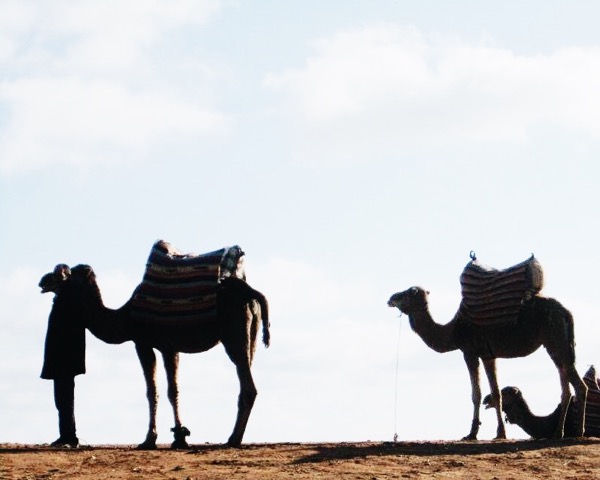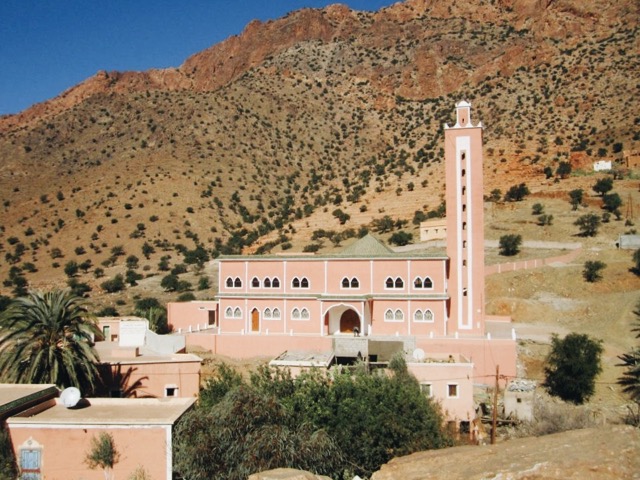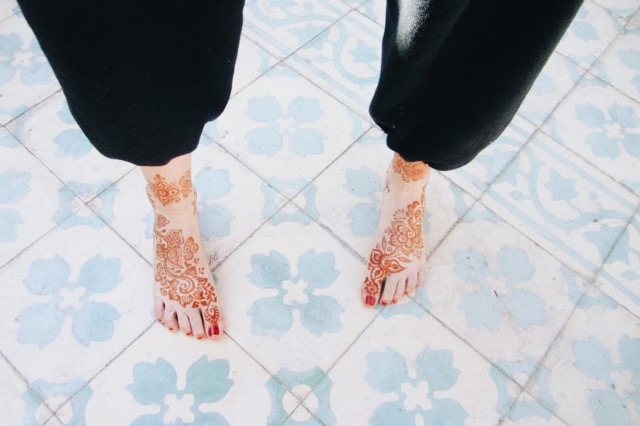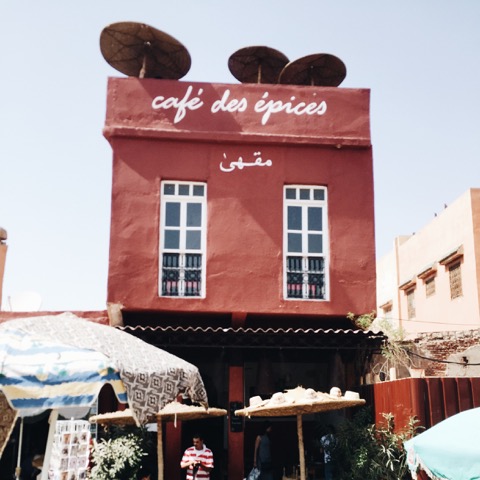How a Gap Year in Morocco Shaped Me
- ImprintEd Abroad

- Mar 1, 2018
- 6 min read
Updated: Aug 21, 2021
By Negina Pirzad
My fellow American roommate and I would wake up to an obnoxious phone alarm, b-line our way to the bathroom by cutting across the mosaic-tiled floor in our living room, and get ready for another day of school and adventures—without disturbing any of our other six host family members. We didn’t need to worry about bothering our host dad, though. He woke up every morning before sunrise and before the first call to prayer sounded. He would throw a waive our way and a subtle smirk for how we always managed to run a few minutes behind.
Our walks lasted anywhere between 20 and 30 minutes, depending on the weather, the traffic, and how hungry we were. Some mornings we braved the bustling streets and crossed through the lawless chaos of motor bikes, horse-drawn carriages, and diesel-run cars. But we also liked to take it slow sometimes, enjoy the scenery, take pictures and videos as we went. The friendly hanut stand close to our school was also a common pit stop for us. Egg and cheese sandwiches never tasted better than those made by the kids who worked the small stand.
The blue gates to our language school opened us back to a world of familiarity: I could hear English trickle out from the windows, both from native speakers and foreign language learners, and the friendly faces at school remained constant, for the most part. It was where our program leaders, colleagues, and in-country teachers and mates would all convene. Whatever disorder we encountered en route to school dissolved with the relief of reaching our program’s home base.
The scholarship program that brought me and ten other Americans to Morocco centered around Arabic language studies, which took up a few hours of our weekdays, understandably. We began with learning some of the colloquial dialect, but then began our formal Modern Standard Arabic classes shortly after. A unique characteristic of Morocco is that its Darija is one of the furthest Arabic dialects from classical Arabic than any other in the world. In order to communicate with locals, I needed to create a mélange of the Standard Arabic we studied in class, with the Darija we practiced for a bit in school but more so with our homestays, and then fill any gaps with my high school-learned French, and then throw in one of the most eloquent and scholarly means of communication: charades.
It was a privilege to learn this new, exciting, and extremely challenging language from native Arabic speakers in an Arab country. With every new phrase, vocabulary list, and grammar point I learned, I could put it to use at the souks after school or at home with my host family. The Moroccan people got a real kick out of us Americans, struggling through our Arabic to communicate with them, but there was an appreciation for our struggle. Instead of forcing them to speak English or have them listen to my poor French, I applied myself and often forced myself to adjust to their way of communicating and, essentially, their way of life.
This trip to Morocco was the first time I ever left the United States and it was the first time I was away from my parents for an extended period. Some would think going to North Africa as your first time abroad is a bit extreme, but doing so was one of the best decisions I’ve ever made. I lived in a developing country that mixed the old with the new, the traditional with the modern, the “East” with the “West”—as some call it—and the only other place I had to compare it to was good ol’ America. I learned to appreciate the differences between these two countries and work to truly understand them. It got rid of the “us” versus “them” mentality that we so often adopt when we don’t know better, or even try to know better.
I also felt a sense of comfort in Morocco—a feeling that I had never felt living in the Pacific Northwest. My family is from Afghanistan. I am ethnically Afghan. I like to identify as an Afghan-American, yet I am a part of the first generation that has never had the opportunity to visit the South Asian country. I only have my parents’ dinnertime stories and my grandma’s “you know, when I was young…” flashbacks to form an idea of what Afghanistan is like. I believe part of why I took to Morocco so quickly, and why I fell in love with my host family without hesitation was because of how much it all reminded of me of my family back home in Oregon, but more significantly, it oriented my mind towards what Afghanistan may be like. The Islamic themes, the cuisine’s flavors and aromas, the sense and importance of community, the presence of music and dancing, the warmth and passion of its people, certain mannerisms and traditions—I could go on and on—but these are a few of the many similarities between Moroccan and Afghan culture I noticed and appreciated.
I view Morocco as my second home now; it is my third culture. My host family are part of my real family and I can now say I have four more sisters, a brother and another set of parents. My program mates are also now some of my closest friends. I travelled from upper-left USA to upper-left Africa during a pivotal point in my life—I was seventeen, going on eighteen. I was unsure about everything at that point: this big decision I made, my religion, what to study in college later on, what to pack, how to present myself to a group of my peers, the Arabic language, and again, what to pack. And it was uncomfortable at times. I got sick on every bus ride. I got sick off the bus, too. I missed my family. I over-packed. I got pick-pocketed. I was victim to and also witnessed street harassment left and right. And saying bslama to my home for seven months was one of the most difficult partings I’ve ever experienced. My Moroccan family and I were in a puddle of our tears as I stuffed my suitcases with clothes, gifts, photos and every ticket, map, schedule and piece of paper I ever received while on the trip. I couldn’t believe the one thing I was looking forward to for so long was actually finished and my instinct was to pack it all away and take it back to America with me. Sure, I could return whenever I wanted to in the future, but I knew it would never feel the same and that I would never be the same as I was in that very moment. But all of these difficult times lent to an incredibly rounded and rich experience that changed my life and continues to do so.
Two full-sized suitcases, a duffle bag, a backpack, a side satchel and I crossed the Atlantic and most of the U.S. to get back home. My henna designed feet, engulfed in leather braided sandals from Jmaa el Fnaa, stepped onto the iconic PDX carpet when all I heard was “Neee-geee-naaaa!!” and saw my family and a bedazzled “Welcome Home” sign that fully punctuated the end of my gap year away and marked the start of my journey I like to call, “What Now?”
Marrakech stuck with me since my time post-program and it continues to guide me and my decisions, I like to think. For example, I have a newfound appreciation for culture shock and reverse-culture shock as experiences. We all need to feel a little discomfort before we’re at ease, in any important situation, and we need to learn how to be mindful in our environments which I believe these “shock”-filled phenomena do for us. The discomfort becomes a challenge for us to overcome and I saw this when I began my Arabic language studies, when I tried to make my first Moroccan purchase, when I first tried my host mom’s cooking, when I first came back home to Oregon and just about every other “first” time doing anything. The satisfaction that comes with getting over these humps invigorates me. And now, I continue to challenge myself in life because I know I am capable of overcoming them. If I could learn the Arabic alphabet in less than two months, I can do anything—right?















Comments